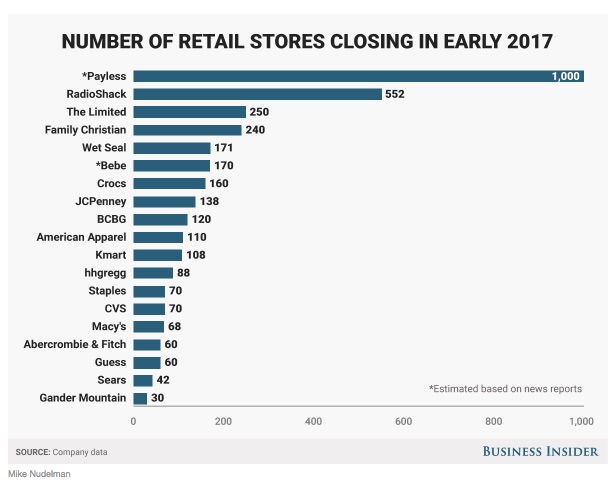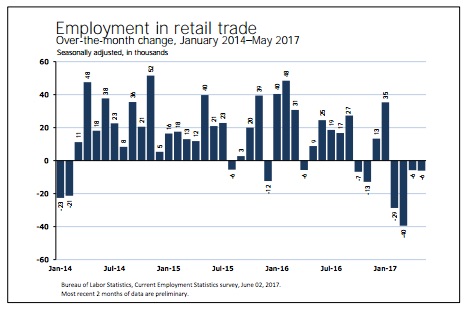J. Crew had a legendary brand. Reading its catalogue before a store visit, the J. Crew customer knew what was right for work, for a date, even for a presidential inauguration.
Wearing J. Crew, Michelle Obama signaled style and affordability:
Where are we going? To closing clothing stores.
A Retail Apocalypse?
J. Crew
During April, J. Crew laid off 150 employees and cut another 100 positions. With revenue down and debt up, their creative director and menswear head departed and they unwound their bridal business.
Asked about J. Crew’s mistakes, its (soon to be replaced) CEO Millard “Mickey” Drexler (but still the Board’s chair) said he was slow in responding to tech. Customers’ online searches emphasized price rather than brands. Competitors like Zara had a super speedy data-driven supply chain. And there was Amazon.
Closing Stores
Like J. Crew, other “beloved” mall brands are in crisis.” The Gap and Abercrombie & Fitch have similar problems. The Limited is gone.
However, as Slate suggests, not all clothing stores are closing. Looking at the following list from Business Insider, more than anything you see the “big box” retailers that sell apparel, electronics, and specialty goods:
Job Losses
At department stores alone, 39,000 employees lost their jobs during the past year. Stores like Radio Shack have eliminated another 11,000 jobs. And, to those 50,000 lost jobs we can add 25,000 from specialty stores that sell sporting goods, hobby items, books and music.
The May employment report from June 2 showed the numbers for retail jobs:
Our Bottom Line: Structural Unemployment
Retailers experience different kinds of unemployment. One steady cause is “friction.” Whether we just graduated from school and are looking for a job or leave one because we are unhappy, always, there is some joblessness. Unemployment also will fluctuate as the business cycle and the seasons unfold.
However, more than friction, the business cycle and seasonal demand, structural unemployment has hit retail. Because of a structural change in the economy, certain jobs and skills become obsolete. Meanwhile though, jobs in new firms replace them. Economist Joseph Schumpeter called the process creative destruction.
When J. Crew’s CEO said he was slow to react to tech, wasn’t he referring to structural change?
My sources and more: My walk today was a bit more pleasant because of this podcast from WNYC on retailing. From there you might enjoy (as did I) further checking out the state of retail. As usual, the hype about a retail apocalypse is less drastic than it appears. But not for J. Crew as this New Yorker article and WSJ explain.









